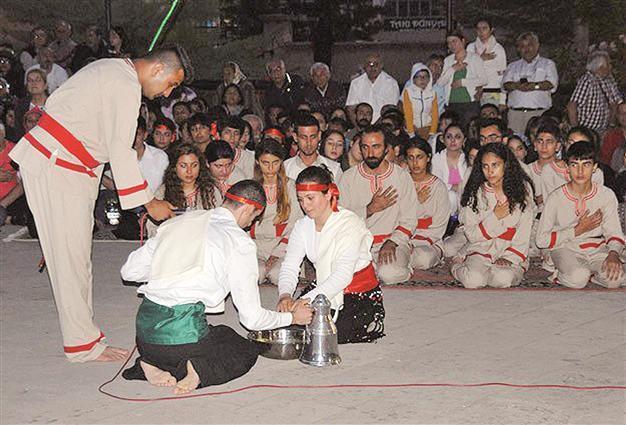Alevis hold religious ceremony in Hacı Bektaş dervish convent after almost two centuries
NEVŞEHİR – Anadolu Agency
 A religious service was held at an Alevi house of worship which has been turned into museum, the Hacı Bektaş-ı Veli dervish convent, for the first time after almost two centuries with the cooperation of Alevi associations from Turkey and Europe.
A religious service was held at an Alevi house of worship which has been turned into museum, the Hacı Bektaş-ı Veli dervish convent, for the first time after almost two centuries with the cooperation of Alevi associations from Turkey and Europe. The Hacı Bektaş-ı Veli dervish convent, which is a popular pilgrimage site for both Alevi and Bektaşi people in Turkey, located in the Central Anatolian province of Nevşehir, was home to a “cem” service July 5 for the first time in 188 years, with permission granted by the Turkish Culture and Tourism Ministry.
Doğan Demir, the head of the Alevi Culture Associations, said they had previously attempted to hold a religious ceremony at the convent but this was the first time such a broad one was being done.
“There were small cems at the convent but this is the first time that Alevi groups from Turkey and Europe are conducting a cem at the Hacı Bektaş-ı Veli dervish convent. This is very important for us. We will make this permanent,” Demir said following the ceremony.
A “cem” is an Alevi worship ceremony which is traditionally held in a cemevi, while Sunnis worship in a mosque. Unlike most other Muslim practices, Alevi rituals are conducted mostly in Turkish. The ceremony features music and a dance called the “sema.”
Stating they had to get permission from the ministry to conduct the ceremony, Demir said it was heartbreaking that they needed to require the state’s approval to hold a cem in their own sanctuaries.
“Until all of the dervish convents are given back to us [by the state], we will continue to hold cem services in these places,” said Demir. “The process will follow like this from now and we are very happy to be here.”
Dervish lodges and convents, small Islamic monasteries (“zaviye” in Turkish) and Islamic shrines (“türbe” in Turkish) have been banned from being used as houses of worship, while the followers of these places were also banned from practicing the rituals with a law in 1925.
Hacı Bektaş-ı Veli is an esteemed figure for the Alevi community, and his tomb is located in the dervish convent, which is currently used as a museum, in Nevşehir.
Alevism is widely perceived as a liberal sect of Islam, although a few characterize it as a belief system separate from Islam. Alevis, who are described as followers of the Caliph Ali, the nephew and son-in-law of the Prophet Muhammad, display religious practices distinct from Turkey’s Sunni majority. The order founded on the teachings of Hacı Bektaş Veli is called “Bektaşi,”
Stating that they had held a meeting with Prime Minister Ahmet Davutoğlu about the return of the dervish convents to Alevi associations from the state long before the June 7 election, Demir said Davutoğlu had promised to meet to discuss the issue. Due to the political situation formed after the election, and with talks to form a coalition government just beginning, he did not know how the process about the promised meeting would proceed, Demir added.
















